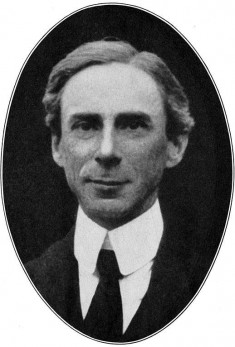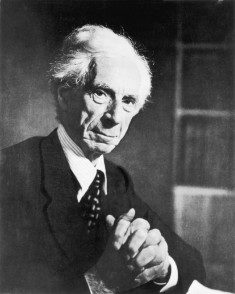| Bertrand Russell | |
|---|---|
 |
|
| Philosopher | |
| Specialty | Analytic philosophy |
| Born | May 18, 1872 Trellech, Monmouthshire, |
| Died | Feb. 2, 1970 (at age 97) Penrhyndeudraeth, Wales, UK |
| Nationality | British |
Bertrand Arthur William Russell was a famous British philosopher, mathematician, logician, historian and social critic. He was born in a famous and prominent aristocratic British family in 1872, in Trellech, Monmouthshire. Bertrand has been the recipient of Noble Prize in Literature for his significant and varied writings, which reflect freedom of thought and humanitarian ideals.
Russell’s Personal Life
Bertrand was born in a famous British family and his parents, Viscount and Viscountess Amberley, were known for being radicals of their times. Bertrand’s family’s popularity can be gauged by the fact that his paternal grandfather was asked by Queen Victoria twice to form a government, serving as her Prime Minister.
Russell had two siblings, Frand and Rachel, both being older than Russell by seven and four years respectively. Russell lost his parents at a very young age. His mother died in 1874 due to diphtheria and his father died soon after that due to bronchitis.
After the death of their parents, Russell and his siblings were taken care of by their paternal grandparents. Russell’s grandmother, Lady Frances Elliot, was the influential family figure in Russell’s early life. She was from a Scottish family and her progressive views had great influence on Russell’s outlook on standing up for principles and social justice which remained with him throughout his life.
Russell’s Growing Interests
As an adolescent, Russell was a very lonely kid and he even contemplated suicide several times. He had a keen interest in mathematics and religion and as per his biography, it was his interest in mathematics that kept him away from suicide. Russell received his education at home by a number of tutors. At the age of 11, Russell got introduced to the work of Euclid, which completely changed his life. During his early years, Russell was also influenced by the works of Percy Bysshe Shelley. After reading several of these religious works at a young age, Russell became an atheist.
College Years
Russell studied at Cambridge and he distinguished himself in mathematics and philosophy. He graduated as high Wrangler in 1893 and became a fellow in 1895. When he was about 17 years of age, Russell met Alys Smith and they became good friends. Russell became close to her family as well, who enjoyed showing off Russell as ‘Lord John’s grandson.’
Russell fell in love with Alys and they got married in 1894. However, their marriage started to fall apart in 1901 after Russell realized one day that he was no longer in love with her. They stayed separated for a long time and finally got divorced in 1921. During the period of their separation, Russell had passionate affairs with a number of women.
Russell’s Greatest Works
 An intellectual giant of the 20th century, Bertrand Russell is well-known for his mathematical logic and analytical philosophy. He had made several contributions to history, education, political theory and religion. In addition, generations of general readers have benefitted from his many popular writings on a wide variety of topics in both the humanities and the natural sciences. His writings had a sense of style and wit, which had an enormous influence on the reader.
An intellectual giant of the 20th century, Bertrand Russell is well-known for his mathematical logic and analytical philosophy. He had made several contributions to history, education, political theory and religion. In addition, generations of general readers have benefitted from his many popular writings on a wide variety of topics in both the humanities and the natural sciences. His writings had a sense of style and wit, which had an enormous influence on the reader.
The Principles of Mathematics was Russell’s first major work. It proposed that the foundations of mathematics could be deduced from a few logical ideas. Like Gottlob Frege, Russell also believed in the theory that mathematics is a continuation of logic and that its subject matter a system of Platonic essences that exist out of the realm of mind and matter.
Another important work, Principia Mathematica was written by both Russell and Alfred North Whitehead, a philosopher and mathematician. In 1912, he published his concise and introductory book, The Problems of Philosophy.
Russell also wrote about sexual morality and agnosticism in his book entitled Marriage and Morals (1929). The book consists of his ideas in the favor of homosexuality and emphasizes that sexual relations between the unmarried people are not wrong. During his experiment at Beacon Hill, he gave life to another book, Education and the Social Order. His other important works include A History of Western Philosophy, Education and the Good Life and Nightmares of Eminent Persons and Other Stories.
During his last years in North Wales, Russell added few more books to his collection. His later works include Human Knowledge: Its Scope and Limits, Satan in the Suburbs and Other Stories, and The Autobiography of Bertrand Russell.
Death and Legacy
Russell’s philosophy believed in the idea of critical thinking. He thinks that philosophy has much to contribute, especially to learning the value of suspended judgment. Russell was an active figure in virtually all aspects of public life. He remained a prominent figure right up to his death at the age of 97.